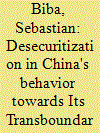|
|
|
Sort Order |
|
|
|
Items / Page
|
|
|
|
|
|
|
| Srl | Item |
| 1 |
ID:
127771


|
|
|
|
|
| Publication |
2014.
|
| Summary/Abstract |
Fresh water has no substitute, and its availability has been declining sharply around the globe. In Asia, China's role as a multidirectional and transborder water provider is unmatched. Analysis of China's behavior towards its transboundary rivers is therefore pivotal. By examining three different case studies-the Mekong River in Southeast Asia, the Brahmaputra River in South Asia and the Irtysh and Ili Rivers in Central Asia-this article seeks to lay the theoretical groundwork for understanding China's behavior. It pits previously applied realist rationales against the more recent notion of desecuritization strategies and makes a case for the latter. While desecuritization implies non- or de-escalation, it does not necessarily mean genuine long-term cooperation. The future of Asia's shared waters may thus be a contentious one.
|
|
|
|
|
|
|
|
|
|
|
|
|
|
|
|
| 2 |
ID:
148329


|
|
|
|
|
| Summary/Abstract |
Full securitization has largely been regarded as something negative that should be avoided. While acknowledging this, the present article adds that securitization moves that fail to succeed (i.e. that end in securitization failure) can, at least in the environmental sector of security, trigger positive outcomes if a given issue becomes (re)politicized rather than depoliticized. This is because securitization moves can be helpful in raising sufficient awareness of an issue to gain the attention of the relevant audience(s). Subsequently, the article argues, different audience strategies determine whether securitization moves are turned into securitization failure as (re)politicization or securitization failure as depoliticization. The article introduces different behavioral strategies that audiences can employ to reject securitization moves: the passive recipient strategy, the blocking strategy, and the active reshaping strategy. Only the latter indicates that an audience not interested in letting securitization moves succeed simultaneously seeks to have the issue in question be, or remain, a part of the political agenda. The article uses the spring 2010 Mekong crisis as a test case to support its theoretical arguments.
|
|
|
|
|
|
|
|
|
|
|
|
|
|
|
|
| 3 |
ID:
185573


|
|
|
|
|
| Summary/Abstract |
As the Sino-American Great Power competition continues to intensify, newly-elected US President Joe Biden's administration now seeks to enlist the support of its allies and partners around the world. As Europe's largest economy and a, if not the, leading voice within the European Union, Germany represents an important puzzle-piece for Biden. But Germany, at least under outgoing chancellor Angela Merkel, has been reluctant to take sides. It is against this backdrop that this article looks into Germany's past and present trilateral relationships with the US and China through the theoretical lens of the so-called strategic triangle approach. Applying this approach, the article seeks to trace and explain German behaviour, as well as to elucidate the opportunities and pitfalls that have come with it. The article demonstrates that Germany's recently gained position as a ‘pivot’ (two positive bilateral relationships) between the US and Chinese ‘wings’ (positive bilateral relations with Germany and negative bilateral relations with each other) is desirable from the perspective of the strategic triangle. At the same time, being pivot is also challenging and hard to maintain. Alternative options, such as entering a US–German ‘marriage’ directed against China, are also problematic. The article therefore concludes that Germany has tough decisions to take going forward.
|
|
|
|
|
|
|
|
|
|
|
|
|
|
|
|
| 4 |
ID:
143566


|
|
|
|
|
| Summary/Abstract |
The so-called ‘nexus’ approach has recently been promoted as addressing externalities across the water, food and energy sectors, thus helping to achieve ‘water/energy/food security for all’, ‘equitable and sustainable growth’ and a ‘resilient and productive environment’. While these are noble goals, this article argues that the reality on the ground appears to be taking a different direction, at least when it comes to China and its neighbours in South and Southeast Asia. There, a new era of large-scale water infrastructure development is creating several security-related problems, which represent serious challenges to the nexus goals. These challenges include food–energy tensions, human security threats and ecological risks. These challenges can also be linked to rising friction surrounding the management of water, food and energy resources in the region. The article argues that, in order for the nexus goals to be achieved in China and the countries on its southern periphery, there must first be increased awareness of this nexus among policy-making elites.
|
|
|
|
|
|
|
|
|
|
|
|
|
|
|
|
| 5 |
ID:
151693


|
|
|
|
|
|
|
|